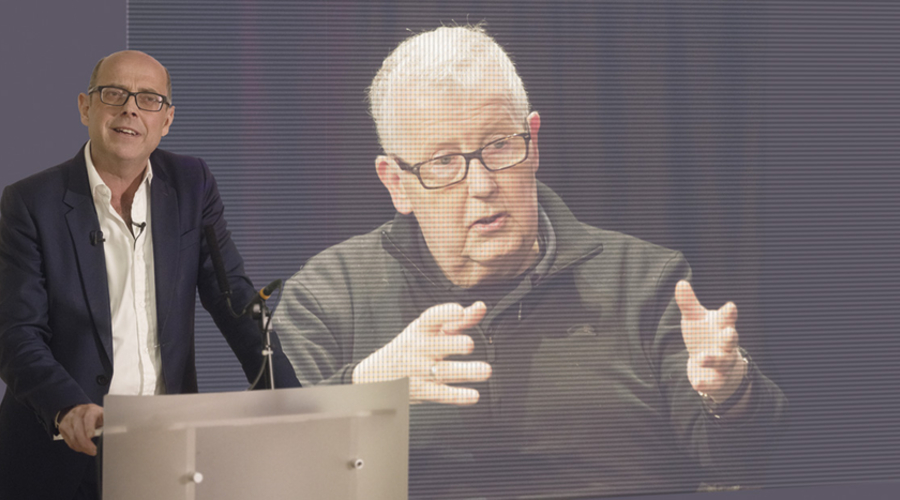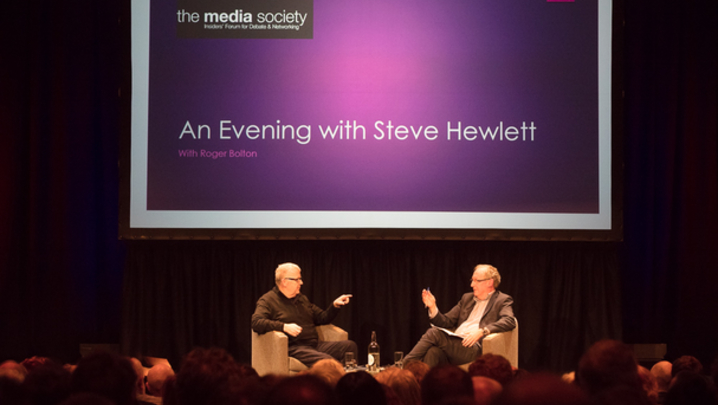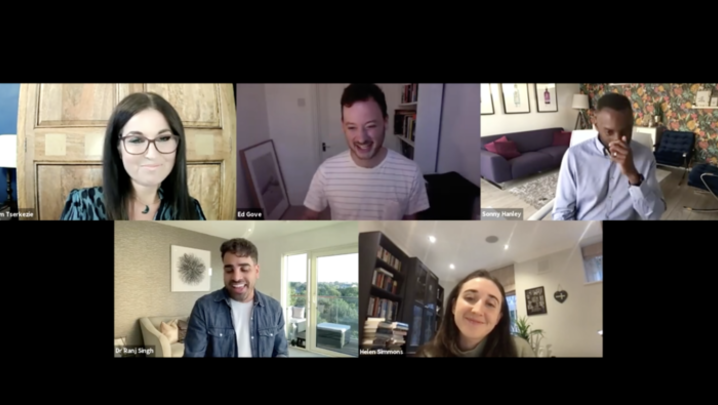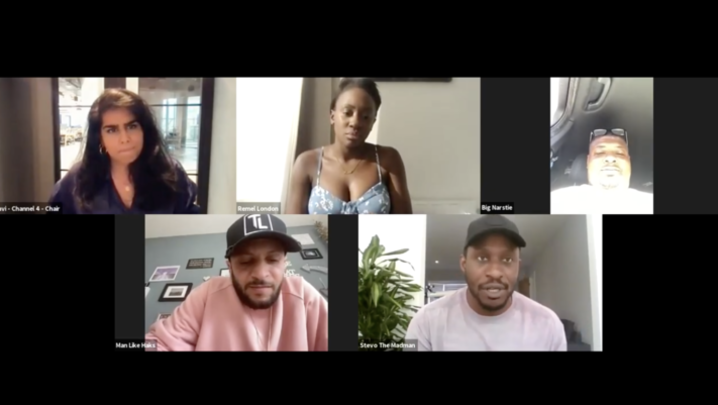Nick Robinson, inspired by the late Steve Hewlett, tells news networks how they can challenge the excesses of social media. Steve Clarke takes notes
If traditional broadcasters are to thrive in an era of social media they need to emulate some of the best qualities of Steve Hewlett’s journalism. That was the essence of the first Steve Hewlett Memorial Lecture, given by BBC broadcaster Nick Robinson, a friend and colleague of Hewlett’s.
Robinson outlined the challenges facing BBC News and other traditional news broadcasters in a heartfelt talk delivered to a packed auditorium at London’s University of Westminster.
The Today presenter offered some remedies for regaining public trust – and, with luck, audiences – on what was an emotionally highly-charged evening. Hewlett died in February, at the age of 58, but his legacy continues to loom large wherever certain sorts of journalists gather together.
Robinson called for a new journalism of engagement – a “mission to engage” in an allusion to John Birt’s “mission to explain” – in order to win back public trust. This had been eroded by the kind of divisions that gave us Brexit.
Robinson recalled the Steve Hewlett he’d first met. In many ways, they couldn’t have been more different. Robinson was Oxbridge-educated. Hewlett was a communist who’d organised a rent strike at the University of Manchester.
“I was as Establishment as you could get, a BBC trainee straight out of university who’d been schooled at the Oxford Union debating society,” recalled the former BBC and ITN political editor.
Hewlett, meanwhile, possessed “an aura of radical chic”. He came with the dangerous whiff of the edgy, early Channel 4.
It was said at Channel 4 that Hewlett had made a film giving a Marxist interpretation of cricket – two of his greatest passions, Robinson remembered as the audience chuckled.
Years later, Hewlett inherited Robinson as his deputy when the former edited the flagship BBC current affairs show Panorama.
It was both men’s subsequent diagnoses of cancer that brought them closer. Robinson was successfully treated for lung cancer but Hewlett’s cancer of the oesophagus was to prove more stubborn.
“When he told me about his diagnosis, I wrote him a beginner’s guide on how to cope with chemotherapy,” said the BBC news man.
Robinson had other fond memories of Hewlett. How, for instance, he supported him during difficult Panorama editions. “When I edited a programme that the Mail dubbed, ‘The BBC’s astonishing Royal attack’, he backed me again. It is what great editors do.”
Today’s media landscape is very different to when Hewlett edited Panorama, more than two decades ago. Alternative news providers have proliferated.
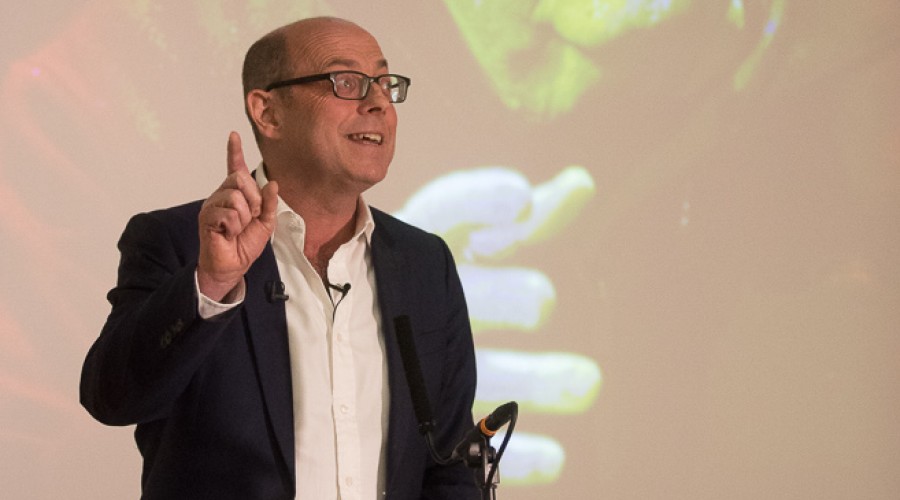
One of the consequences of this growth in digital news, driven by social media, has been that millennials largely ignore the news output of the traditional UK TV networks, said the Today presenter.
Unless broadcasters raised their game, said Robinson, there was a risk that future generations would be lost to quality news organisations such as the BBC, ITN and Sky News.
Engagement was key and would “involve finding new ways to ensure on-air diversity – not just gender, ethnicity and age but, crucially, background, too: class, region, nation and education.
“And what should come with it – diversity of thinking.”
News was too important to be reduced to a three-letter abbreviation – OMG, LOL or WTF – as “powerful algorithms prioritise emotion over facts and analysis”, and Facebook prevented people accessing BBC news coverage.
Trust in UK news has fallen by 7%, according to the latest data from the Reuters Institute Digital News Report. And, according to a YouGov survey, Wikipedia entries were judged to be marginally more trusted than the BBC.
“Fewer and fewer young people are watching BBC News on the TV,” Robinson warned. “More of them are reading news on social media while sitting on the bog.”
Last year, however, the reach of BBC News among adults was 75% – higher than any other UK news provider. Audience figures for Today were at record levels.
Despite this, attacks on mainstream media have mushroomed during the past three years. Robinson discovered this first-hand during his coverage of the Scottish independence vote – and, more recently, during this summer’s attack on a mosque in Finsbury Park, north London.
There, local Muslims were furious that the BBC failed to initially describe the incident as terrorism. They turned their anger on Robinson when he arrived on the scene.
He said that attacks on media such as the BBC were “part of a guerrilla war being fought on social media, day after day and hour after hour”. As a growing number of people were drawn to what Robinson described as “identity journalism”, the Today presenter called on traditional news broadcasters to take their lead from Hewlett and be more willing to challenge received opinions.
The rise of Jeremy Corbyn provided an example: “The ideas that made Corbyn popular – whether scrapping Trident or renationalisation – should be examined and interrogated in their own right and not simply as a cause of rows or splits.”
He added: “Too many interviews with Jeremy fail to take him and his ideas seriously enough.”
As regulators and broadcasting executives think hard about social class and their own employment practices, again, Hewlett provided a role model.
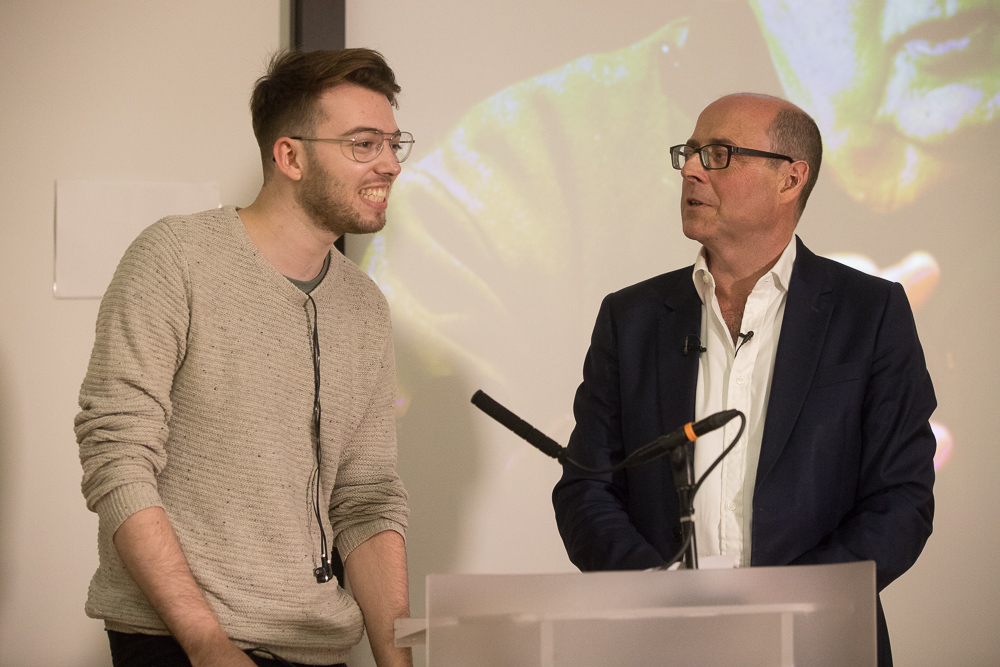
and Nick Robinson (Credit: Paul Hampartsoumian)
Hewlett’s BBC career was initially blocked because the corporation’s in-house M15 representative singled him out as a potential security risk because of his communist past.
Amplifying his call for “diversity of thinking”, Robinson said the approach involved “not just who we employ, but how we do our jobs”. He continued: “We should get out more, we should study the polls with more, not less intensity, and we should look for underlying trends.
“That does not mean extending still further the fatuous vox poppery that is a substitute for a serious examination of voter attitudes. Filming on a high street until you have obtained clips of contradictory opinions tells the viewer next to nothing. Exploring the roots of people’s attitudes can do.”
Alongside his “mission to engage”, Robinson said that organisations such as the BBC needed to remake the case for impartiality.
Relaxing impartiality rules would risk UK news broadcasting becoming like that of the US. There, audiences watch the news channel that most corresponds to their own world view.
Impartial news risked being undermined by state-owned news channels such as Al Jazeera and services run by the Chinese, French and Iranian governments.
Robinson disagreed with James Murdoch’s view that a regulated news system such as Britain’s amounted to “authoritarianism”. He claimed that, prior to the 2010 general election, Murdoch had lobbied the Conservatives hard to dismantle Ofcom.
Part of Murdoch’s aim, according to a senior Tory minister who had spoken to Robinson, was to secure full control of BSkyB and to turn Sky News into a channel to challenge what he saw as the BBC’s innate liberal bias.
In order to broadcast “the best obtainable version of the truth”, Robinson called on the BBC to introduce greater transparency into its journalism.
Part of this would involve “translating Producers’ Guidelines into fluent human”, being swifter at dealing with complaints and more assertive in nailing politicians’ lies.
“I confess that I discussed having a sort of giant fridge magnet made to attach to the Vote Leave bus carrying the words of the many independent figures who pointed out the inaccuracy of their central claim,” Robinson noted wryly.
He said that there was something else which traditional news broadcasters could take from Hewlett’s modus operandi: what he had called the did-it-pass-my-mum? test.
“I hope I am not patronising Steve’s mum, Vera, or indeed mine, when I say that the test of our journalism is whether it would seem relevant, comprehensible and engaging to them… or anyone of any age or gender or background who is not a news junkie or political trainspotter,” explained Robinson.
“In a world in which there is ever more information but it gets ever harder to reach the people you want to reach, our challenge is to engage people whom we could once take for granted.
“It is that mission which – along with the Steve Hewlett Scholarship – would be a fitting testimony to Steve.”
The Steve Hewlett Memorial Lecture is a joint initiative between the RTS and the Media Society. Nick Robinson gave his talk at the University of Westminster in central London on 28 September. The producer was John Mair.

